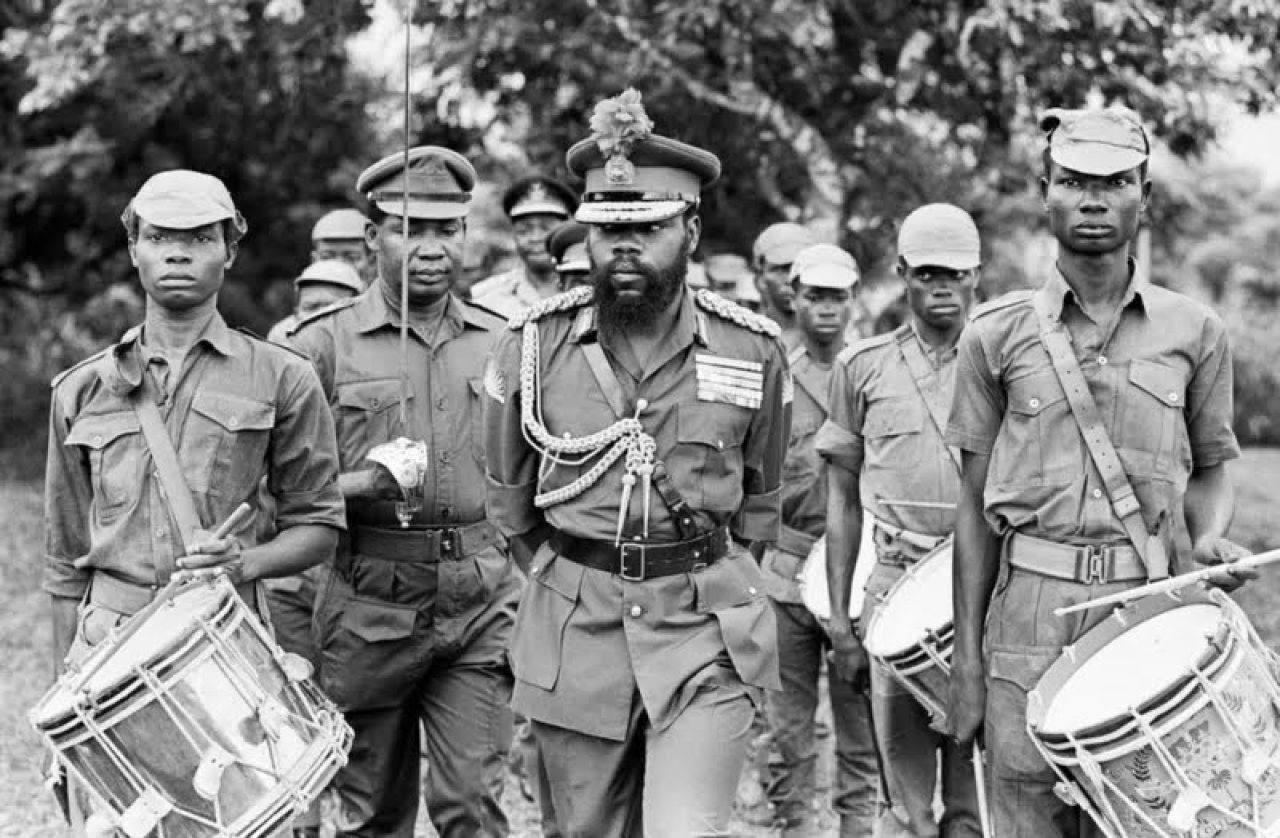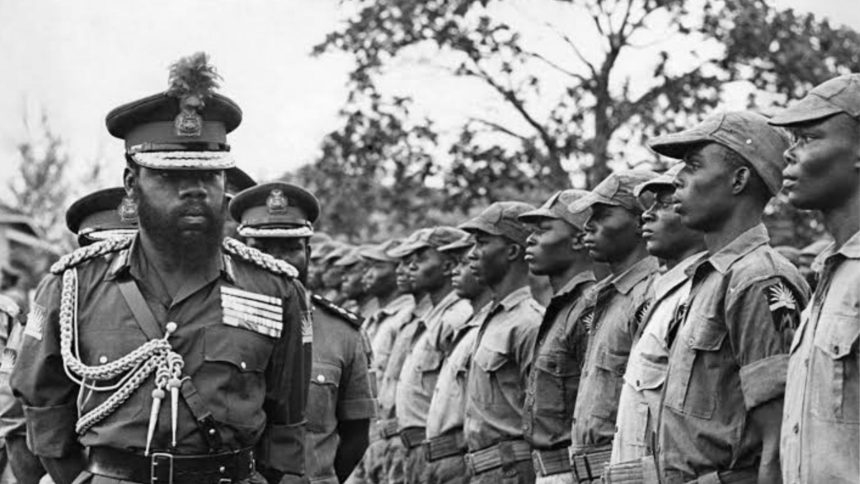On November 4, 1933, Chukwuemeka “Emeka” Odumegwu-Ojukwu was born to Sir Louis Odumegwu Ojukwu, an Igbo businessman from present-day Nnewi, Anambra State in southeast Nigeria. Sir Louis was a prominent figure in the transportation industry and became Nigeria’s wealthiest man, capitalizing on the post-World War II economic boom. Emeka Ojukwu began his academic journey in Lagos, southwest Nigeria.
At the age of ten in 1943, Emeka Ojukwu started his secondary education at CMS Grammar School in Lagos. He later transferred to King’s College in Lagos in 1944. During his time at King’s College, he was involved in an incident where he assaulted a British teacher who had intervened in a student strike. The local publications extensively covered this incident.
When Emeka was thirteen, his father sent him to the United Kingdom to pursue further education. He first attended Epsom College and then Lincoln College, Oxford University, where he earned a master’s degree in History. In 1956, he returned to colonial Nigeria.
Ojukwu’s career in the government of Eastern Nigeria began as an administrative officer in Udi, which is now Enugu State. After two years in the colonial civil service, he left in 1957 to escape his father’s influence on his civil service career. He initially enlisted in the military in Zaria as a non-commissioned officer (NCO).

Due to his father’s political maneuvering with the then-Governor-General of Nigeria, Emeka Ojukwu was compelled to enlist as an NCO since he was denied an officer-cadetship. However, he demonstrated determination and dedication, impressing the British Depot Commander, who eventually nominated him for an officer’s commission. Ojukwu’s journey led him from Zaria to Teshie, Ghana’s Royal West African Frontier Force Training School, and then to Eaton Hall, where he received his appointment as a 2nd Lieutenant in March 1958.
Ojukwu was among the few native Nigerian officers in the Nigerian Military Forces at the time, with the majority of officers being of British origin. In 1964, he was promoted to Lieutenant-Colonel and transferred to Kano, where he took charge of the 5th Battalion of the Nigerian Army.
In January 1966, when Major Patrick Chukwuma Kaduna Nzeogwu executed a violent military coup in Kaduna, Ojukwu was in Kano. His presence helped quell the coup’s momentum in the north, where it had initially succeeded. Major-General Johnson Thomas Aguiyi-Ironsi, the Supreme Commander of the Nigerian Armed Forces, received Ojukwu’s support. Although the coup failed in other regions, Major Nzeogwu had control over Kaduna.
Aguiyi-Ironsi assumed control of the government, becoming Nigeria’s first military leader. On January 17, 1966, he appointed military governors for the four regions, with Lt. Col. Odumegwu-Ojukwu chosen as the military governor of the Eastern Region.
In May 1966, an anti-Igbo pogrom erupted, causing difficulties for Ojukwu. Despite efforts to avoid retaliation and promises of safety from colleagues in the north and west, the situation worsened. In July 1966, a counter-coup led by Northern officers took place, resulting in the abduction and killing of General Aguiyi-Ironsi and Colonel Fajuyi in Ibadan.
Ojukwu, serving as the military governor of the Eastern Region, managed to resist the coup attempt in the southeast due to the brigade commander’s efforts and the reluctance of Northern officers stationed there. Brigadier Babafemi Ogundipe, the most senior army officer after Ironsi’s death, was unable to assert his authority in Lagos, leading to a stalemate between Ojukwu and Yakubu Gowon, both holding the same rank. This stalemate eventually triggered the Nigerian civil war.
In January 1967, a peace conference was held in Aburi, Ghana, with Ojukwu and Gowon present. However, the accords made at Aburi broke down upon their return to Nigeria. On May 30, 1967, Ojukwu declared Eastern Nigeria a sovereign state called Biafra. This declaration led to a war between Biafra and Nigeria, with Gowon launching an attack on Biafra in July 1967.
Despite several peace conferences and diplomatic efforts, the war persisted. Ojukwu sanctioned the execution of some accused coup plotters from 1966 during the war. After 2.5 years of fighting and facing malnutrition, Ojukwu realized the war was unwinnable and fled the country to avoid being killed. He handed over authority to his deputy and departed for the Ivory Coast.
In 1981, Ojukwu initiated his campaign to return to Nigeria. In 1982, he received a pardon from Nigerian President Shehu Aliyu Usman Shagari, allowing him to reenter the country as a private citizen. He returned to Nigeria in June 1982. He ran for the Nigerian Senate in 1983 but lost in a controversial election. The subsequent overthrow of the Shagari government in December 1983 led to Ojukwu’s imprisonment, followed by his release later that year.
In 1994, Ojukwu married Bianca Onoh, a former Miss Intercontinental and future ambassador. They had three children together. Ojukwu made unsuccessful bids for the Nigerian presidency in 2003 and 2007 under the Fourth Republic.
Ojukwu passed away in the UK on November 26, 2011, at the age of 78. His remains were flown back to Nigeria, where the Nigerian Army held a funeral parade and awarded him the highest military honor. He was laid to rest in a newly constructed mausoleum in his hometown of Nnewi. His funeral lasted nearly a week and included processions through various Nigerian states, as well as memorial ceremonies and gatherings held throughout the country and even abroad.





